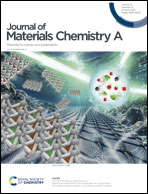Non-halogenated and non-volatile solid additive for improving the efficiency and stability of organic solar cells†
Abstract
Various high boiling point solvent additives are commonly used for high-performing organic solar cells (OSCs). However, they are not only usually detrimental to device stability but also often contain halogens, rendering them highly reactive and environmentally unfriendly. Herein, a non-halogenated and non-volatile solid additive, 2-(4-phenoxybenzylidene)-1H-indene-1,3(2H)-dione (PID), is synthesized for the preparation of high-performing and highly stable non-fullerene acceptor (NFA)-based OSCs. PID introduction enhances the molecular ordering of the photoactive materials and optimizes their nanoscale phase-separated morphology by controlling intermolecular interactions. The power conversion efficiency (PCE) of the resulting PID-processed OSC devices increases from 13.9% to 16.3%, surpassing that of 1-chloronaphthalene (CN)-processed devices (15.5%). Moreover, when burn-in losses are eliminated, the PID-processed devices demonstrate excellent thermal stability, retaining 98% of their initial PCE after 1200 h at 85 °C. Such high thermal stability renders these devices among the most stable PM6:Y6-based OSCs reported to date. The results suggest that non-volatile solid additives can simultaneously enhance the efficiency and stability of OSC devices without halogens, thereby opening up possibilities for their future commercial applications.



 Please wait while we load your content...
Please wait while we load your content...